Tsai Hsu-chih (蔡旭志) wanted to escape his family’s tea farm so badly that he chose to attend a maritime vocational high school in Keelung.
“I ran from the mountains to the ocean,” the fourth-generation tea farmer and restaurant owner laughs. “That’s far enough, isn’t it?”
Tsai only returned home to New Taipei City’s Sijhih District (汐止) after the local tea industry declined and his family, like many other agricultural operations near Taipei, converted their property into a tea restaurant in the 1990s. Over the decades, Tsai and his wife have maintained a stable living with their tantalizing menu of tea-infused cuisine — but about five years ago, he set out to revive the family’s tea farm, this time using organic methods.
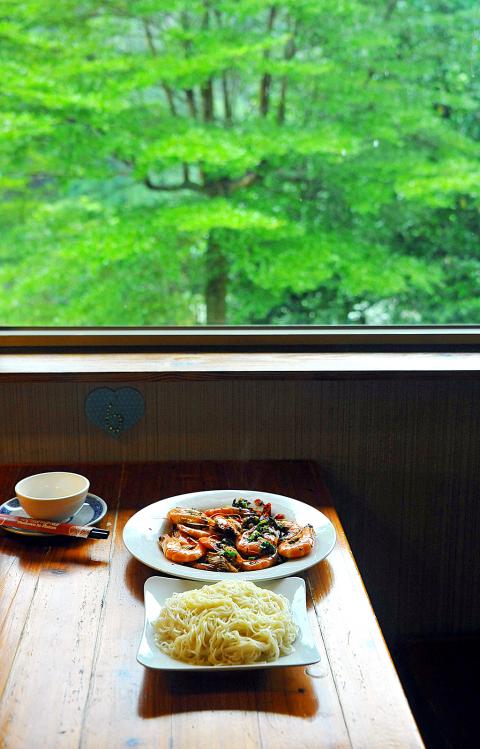
Photo: Han Cheung, Taipei Times
“I guess I got to the age where I started thinking about preserving our heritage,” Tsai says. “Baozhong Tea (包種茶) actually originated near this area … I don’t want people to forget that Sijhih once produced tea. All these mountains used to be tea farms.”
There are no tea-pickers in the area, and Tsai has to drive elderly ladies — the youngest one being 78 years old — from nearby Pinglin (坪林) to perform the task. He feels that if he doesn’t create more interest in the local tea industry now, all will be lost to history soon.
REVIVING SIJHIH’S TEA
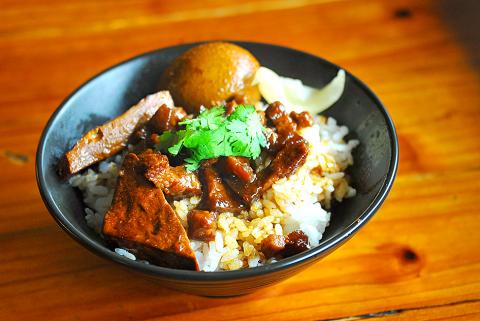
Photo: Han Cheung, Taipei Times
I didn’t plan on visiting Tsai’s Natural Tea Manor (天然茶莊) to learn about tea. In fact, my family has lived in Sijhih for 30 years and I had no clue it was once a bustling tea center. But it makes sense — Taiwan’s famous Baozhong Tea originated in adjacent Nangang District (南港), and Tsai’s plantation is much closer to Nangang than downtown Sijhih.
When the coal industry boomed in the mountains of northern Taiwan, Tsai says many local tea farmers turned to mining. As Taipei expanded east, the land here also became valuable, and tea farmers found it more lucrative to “plant houses,” in Tsai’s words. Like Tsai, young people weren’t keen to continue the family business, and soon Pinglin took over as the main Baozhong tea producing center.
I actually came to speak to Tsai about Natural Tea Manor’s participation in New Taipei City’s “cherishing food” (惜食) program that encourages restaurants to make use of surplus or unsellable agricultural products to reduce food waste.
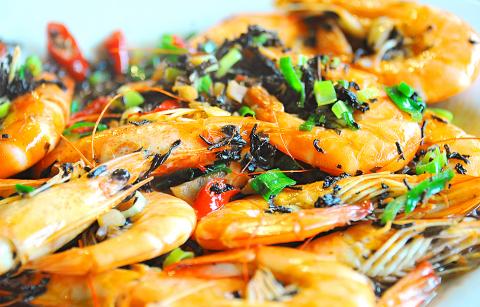
Photo: Han Cheung, Taipei Times
The restaurant maintains a network where they buy “ugly” and excess vegetables from farmers, but that was pretty much it to the story. Tsai’s dreams of reviving Sijhih’s tea industry and his restaurant’s tea menu were much more intriguing.
The main problem Tsai faces, like in many traditional industries, is the lack of skilled workers. The tea pickers and terrace workers have specific experience and knowledge that machines cannot replace, such as discerning which individual plants to pick at which times. While machines can still do the job, it isn’t ideal.
Tsai is betting on reviving the industry first — if he generates enough work in the area, he could start training new people to pick leaves as a part-time job. Young people likely won’t be interested, but he could target housewives or older people looking to re-enter the workforce.
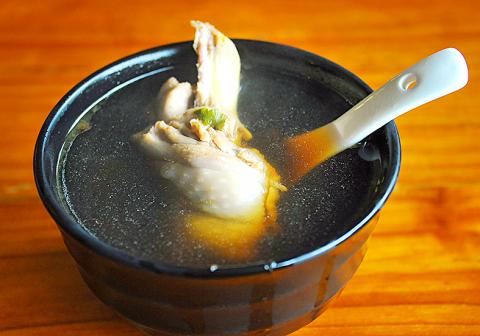
Photo: Han Cheung, Taipei Times
Last week, he hired workers to terrace another piece of land to expand his farm, and he is in the process of setting up a licensed tea processing factory that can support several farms. He wants to attract students and tourists to learn about this area’s history and try their hand at picking and processing tea, and hopes that his success will influence his neighbors to also revive their plantations.
TEA IN EVERYTHING
The Tsai family had no idea how to run a restaurant in the beginning, pretty much catering to the whims of his visitors. They eventually shut the restaurant down to develop their own style using tea leaves.
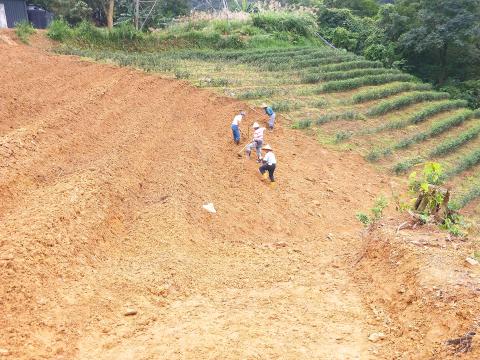
Photo courtesy of Tsai Hsu-chih
“We didn’t just want to throw leaves on the food, we wanted the food to be infused with tea,” Tsai says. Starting from a bare-bones menu of tea oil rice and noodles, tea chicken soup, tea sweets and vegetables, Natural Tea Manor grew from there.
The first dish I sample actually has no tea in it — it’s a traditional Taiwanese braised pork rice bowl (NT$80) that imitates the lunch boxes served to tea pickers back in the day. Natural Tea Manor’s version of this ubiquitous dish made it into the nation’s top 10 during last year’s Taiwan Braised Pork on Rice Festival, and it does stand out — the pork is chewy and tender with the skin, fat and meat well-proportioned and distinguishable, and the flavoring is a simple soy-sauce, sugar and shallot concoction that isn’t too heavy.
“If your food wasn’t good, the tea pickers wouldn’t come work for you again,” Tsai says. “They would always compare which plantation offered better meals.”
The tea-infused dishes are very subtle, with the leaves providing just a little bit of fragrance and bitterness with a pleasing aftertaste. The flavor is most noticeable in the tea oil noodles (NT$80), which are just slightly salted with the oil carrying the main tones.
The chicken soup tastes pretty standard until the aftertaste of the leaves linger on the tongue; the tea fragrance and slight bittersweetness is more noticeable in the oolong shrimp (NT$380), which comes in a rich scallion and chili pepper sauce. The tea’s properties seem to have completely infused into the shrimp and the sauce, and the leaves can be eaten without overpowering the rest of the dish.
The restaurant also serves a variety of homegrown vegetables (price depends on season) and sweets such as tea jelly (NT$20), glutinous tea cakes (NT$40) and tea mantou (NT$90). Other intriguing items I would like to try next time are the tea lemon fish (NT$480) and the tea drunken chicken (NT$480).

April 14 to April 20 In March 1947, Sising Katadrepan urged the government to drop the “high mountain people” (高山族) designation for Indigenous Taiwanese and refer to them as “Taiwan people” (台灣族). He considered the term derogatory, arguing that it made them sound like animals. The Taiwan Provincial Government agreed to stop using the term, stating that Indigenous Taiwanese suffered all sorts of discrimination and oppression under the Japanese and were forced to live in the mountains as outsiders to society. Now, under the new regime, they would be seen as equals, thus they should be henceforth

Last week, the the National Immigration Agency (NIA) told the legislature that more than 10,000 naturalized Taiwanese citizens from the People’s Republic of China (PRC) risked having their citizenship revoked if they failed to provide proof that they had renounced their Chinese household registration within the next three months. Renunciation is required under the Act Governing Relations Between the People of the Taiwan Area and the Mainland Area (臺灣地區與大陸地區人民關係條例), as amended in 2004, though it was only a legal requirement after 2000. Prior to that, it had been only an administrative requirement since the Nationality Act (國籍法) was established in

With over 80 works on display, this is Louise Bourgeois’ first solo show in Taiwan. Visitors are invited to traverse her world of love and hate, vengeance and acceptance, trauma and reconciliation. Dominating the entrance, the nine-foot-tall Crouching Spider (2003) greets visitors. The creature looms behind the glass facade, symbolic protector and gatekeeper to the intimate journey ahead. Bourgeois, best known for her giant spider sculptures, is one of the most influential artist of the twentieth century. Blending vulnerability and defiance through themes of sexuality, trauma and identity, her work reshaped the landscape of contemporary art with fearless honesty. “People are influenced by

The remains of this Japanese-era trail designed to protect the camphor industry make for a scenic day-hike, a fascinating overnight hike or a challenging multi-day adventure Maolin District (茂林) in Kaohsiung is well known for beautiful roadside scenery, waterfalls, the annual butterfly migration and indigenous culture. A lesser known but worthwhile destination here lies along the very top of the valley: the Liugui Security Path (六龜警備道). This relic of the Japanese era once isolated the Maolin valley from the outside world but now serves to draw tourists in. The path originally ran for about 50km, but not all of this trail is still easily walkable. The nicest section for a simple day hike is the heavily trafficked southern section above Maolin and Wanshan (萬山) villages. Remains of